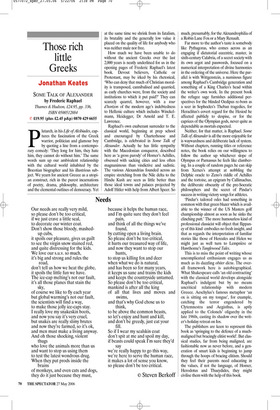Those rich little Greeks
Jonathan Keates
SOME TALK OF ALEXANDER by Frederic Raphael Thames & Hudson, £24.95, pp. 336, ISBN 0500512884 ✆ £19.95 (plus £2.45 p&p) 0870 429 6655 Plutarch, in his Life of Alcibiades, captures the fascination of the Greek warrior, politician and glamour boy by quoting a line from a contemporary comedy: ‘They long for him, they hate him, they cannot do without him.’ The same words sum up our ambivalent relationship with the cultural world inhabited by the Boeotian biographer and his illustrious subject. We yearn for ancient Greece as a utopian construct, rich in the purest incarnations of poetry, drama, philosophy, architecture and the elemental outlines of democracy. Yet at the same time we shrink from its fatalism, its brutality and the generally low value it placed on the quality of life for anybody who was neither male nor free.
How much we have been unable to do without the ancient Greeks over the last 2,000 years is neatly underlined for us in the opening pages of Frederic Raphael’s latest book. Devout believers, Catholic or Protestant, may be irked by his rhetorical, ‘Who can deny that much of Christian morality is transposed, cannibalised and quarried, as early churches were, from the society and institutions to which it put paid?’ They can scarcely quarrel, however, with a tour d’horizon of the modern age’s indebtedness to Hellenic culture which includes Winckelmann, Heidegger, Dr Arnold and T. E. Lawrence.
Raphael’s own exuberant surrender to the classical world, beginning at prep school and encouraged by Charterhouse and Cambridge, is celebrated in Some Talk of Alexander. Actually he has little sympathy with the Macedonian conqueror, described here as ‘a gross parody’ of Homer’s Achilles, obsessed with sacking cities and less often magnanimous than vindictive and sadistic. The various Alexandrias founded across an empire stretching from the Nile delta to the Hindu Kush are seen as little better than those ideal towns and palaces projected by Adolf Hitler with help from Albert Speer. So much, presumably, for the Alexandrophilia of a Robin Lane Fox or a Mary Renault.
Far more to the author’s taste is somebody like Pythagoras, who comes across as an engaging if dictatorial eccentric, master, in sixth-century Calabria, of a secret society with its own argot and passwords, focused on a numerical interpretation of divine harmonies in the ordering of the universe. Here the parallel is with Wittgenstein, a numinous figure among Raphael’s Cambridge generation and something of a King Charles’s head within the writer’s own work. In the present book the refugee sage furnishes additional perspectives for the blinded Oedipus re-born as a seer in Sophocles’s Theban tragedies, for Heraclitus’s covert regard for the Hesiod he affected publicly to despise, or for the caprices of the Olympian gods, never quite as dependable as mortals expected.
Neither, for that matter, is Raphael. Some Talk of Alexander is all the more enjoyable for is waywardness and deliberate lack of system. Without chapters, running titles or reference notes, the book relies on our willingness to follow the author up whichever slope of Olympus or Parnassus he feels like clambering. In a couple of random pages he can skip from Xerxes’s attempt at nobbling the Delphic oracle to Zeno’s riddle of Achilles and the tortoise, an epigram by Callimachus, the deliberate obscurity of the pre-Socratic philosophers and the secret of Pindar’s success in writing victory songs for athletes.
‘Pindar’s tailored odes had something in common with that green blazer which is available to the winner of the US Masters golf championship almost as soon as he sinks the clinching putt.’ The more humourless kind of professional classicist will object that flippancy of this kind embodies no fresh insight, and that as regards the interpretation of familiar stories like those of Hercules and Helen we might just as well turn to Lemprière or Hawthorne’s Tanglewood Tales.
This is to miss the point of writing whose uncomplicated enthusiasm engages us as much as its dazzling obiter dicta. The overall framework here is autobiographical. What Shakespeare calls ‘an old contracting’ with the classical world develops alongside Raphael’s indulgent but by no means uncritical relationship with modern Greece. Aeschylus’s famous metaphor ‘an ox is sitting on my tongue’, for example, catching the terror engendered by Clytemnestra and Aegisthus, is aptly applied to the Colonels’ oligarchy in the late 1960s, casting its shadow over the writer’s holiday retreat on Ios.
The publishers are keen to represent this book as ‘springing to the defence of a muchmaligned but bracingly elitist world’. But classical studies, far from being maligned, are fashionable now as never before, and a generation of smart kids is beginning to jump through the hoops of bracing elitism. Should they feel their parents need educating in the values, if not the language, of Homer, Herodotus and Thucydides, they might civilise them with the help of this book.










































































































 Previous page
Previous page